|
|
|
Sort Order |
|
|
|
Items / Page
|
|
|
|
|
|
|
| Srl | Item |
| 1 |
ID:
162776
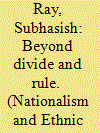

|
|
|
|
|
| Summary/Abstract |
Existing cross-national research on inter-communal violence has demonstrated that ex-British colonies are more prone to inter-communal violence than ex-colonies of other European powers. This finding has been attributed to the greater prevalence of divide-and-rule policies in ex-British colonies. This explanation is, however, incomplete since it implicitly assumes that British imperial policy profoundly transformed pre-colonial political realities. This article argues, instead, that the impact of British divide and rule strategies on subsequent inter-communal violence is crucially contingent on the level of political centralization attained by communal groups in the pre-colonial era. Drawing on a novel dataset tracking ethnic group dyads in 21 ex-British colonies across the period 1940-2006, I provide robust evidence indicating that the pathway from the experience of British colonial rule to contemporary inter-communal violence is more complex than hitherto appreciated.
|
|
|
|
|
|
|
|
|
|
|
|
|
|
|
|
| 2 |
ID:
171225


|
|
|
|
|
| Summary/Abstract |
The end of dominant party rule is a fraught moment for political-bureaucratic relations in developing countries, with critical implications for public service delivery. This article examines political change in the state of West Bengal in eastern India, where a coalition of left-wing parties was deposed from power in 2011 by a populist opposition after 34 years of uninterrupted rule. The “change” party in West Bengal has not only avoided bureaucratic instability, public officials were successfully mobilized to increase the flow of public services. I argue that this anomaly can be explained by incorporating two variables whose effects have been under-theorized in existing research – the nature of the political mandate against the erstwhile dominant party and the organizational structures of the alternation party. More specifically, I argue that the electoral disintegration of the Left and the populist orientation of the new ruling party were crucial in producing a framework for cooperative political-bureaucratic relations. In the long run, however, as the frequently insufficient quality of these services indicate, only a programmatic mode of party politics can deliver lasting citizen satisfaction.
|
|
|
|
|
|
|
|
|
|
|
|
|
|
|
|
| 3 |
ID:
167440
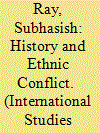

|
|
|
|
|
| Summary/Abstract |
How does the trajectory of precolonial political institutions affect contemporary ethnic conflict? I argue that ethnic groups that were governed by centralized political institutions in the precolonial period are more likely to be associated with armed conflict in the present, but that colonial state-building strategies mediate this relationship. Ethnic groups that experienced precolonial centralization were likely to be underrecruited to the top ranks of colonial security forces prior to independence. This, in turn, increased the chances that those groups would be excluded from the first postindependence regime and hence become involved in armed conflict against the state in the long run. Conversely, colonial security forces tended to overrecruit ethnic groups that did not experience precolonial centralization. This made those groups more likely to become part of the first postindependence regime and less likely to enter into armed conflict against the state in the long run. I provide robust evidence for this pathway by using a self-collected dataset on ethnic groups in ex-British colonies. The findings underscore how contemporary ethnic conflict is embedded in longer-term historical state-building processes in hitherto unappreciated ways.
|
|
|
|
|
|
|
|
|
|
|
|
|
|
|
|
| 4 |
ID:
157940
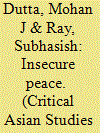

|
|
|
|
|
| Summary/Abstract |
This paper examines emerging citizen and local government relations in a village in the Junglemahal region of the state of West Bengal, once a major bastion of the Maoist insurgency in India. Since 2014, Junglemahal has not experienced a single Maoist-related incident. This has been widely attributed to the West Bengal government’s “model” handling of the insurgency, which rests on the rapid mobilization of public services through the non-elected arms of local governments, bypassing elected officials. How have Junglemahal’s residents experienced this particular form of post-conflict governance? Drawing on the culture-centered approach that ethnographically observes the processes of identifying development problems and developing community-grounded solutions to these problems, our findings indicate that the hyper-developmental state was paradoxically experienced by our respondents as a very distant entity. A recurrent theme in our interviews is the absence of a locally embedded party leadership that could be approached regarding issues of distributive justice. We argue that this desire for party mediation in public service delivery is an expression of a powerful social norm that has survived the conflict and ought to be integrated into post-conflict governance structures if the current peace is to endure.
|
|
|
|
|
|
|
|
|
|
|
|
|
|
|
|
| 5 |
ID:
121820
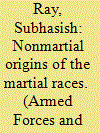

|
|
|
|
|
| Publication |
2013.
|
| Summary/Abstract |
Did colonial rule "construct" the "martial races" or do these groups have an innate cultural disposition toward military service? Despite the centrality of this question for evaluating different military manpower recruitment strategies in postcolonial settings, no study has subjected these hypotheses to systematic empirical testing. This article fills this gap using an original data set on the colonial status of 181 ethnic groups across twenty-nine ex-British colonies to examine the origins of colonial "martialness." The empirical analysis provides robust evidence in support of the constructivist argument.
|
|
|
|
|
|
|
|
|
|
|
|
|
|
|
|
| 6 |
ID:
188331
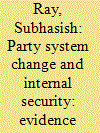

|
|
|
|
|
| Summary/Abstract |
Has the consolidation of the Hindu nationalist Bharatiya Janata Party (BJP) as the dominant party at the national level since the 2014 Lok Sabha election affected internal security outcomes in India? This question assumes particular significance because of the primacy accorded to the use of force in the BJP’s counter-insurgency (COIN) strategy. Using sub-national data on insurgency-related fatalities from 2005–2021, I examine whether states where the BJP received the largest share of votes in the 2014 Lok Sabha election subsequently experienced any significant changes in the pattern of fatalities. Implementing a difference-in-difference econometric specification, I show that the BJP states experienced a relatively sharper decline in security force fatalities from pre-2014 compared to non-BJP states. However, there was no such effect on civilian fatalities or the total number of insurgency-related incidents. Taken together, these findings show that the greater thrust towards militarism in COIN strategy under the BJP, has, paradoxically, increased the security of military/police personnel involved in COIN operations, without commensurate changes in the security of those whom they are mandated to defend.
|
|
|
|
|
|
|
|
|
|
|
|
|
|
|
|
| 7 |
ID:
148480
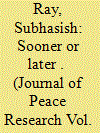

|
|
|
|
|
| Summary/Abstract |
A well-known finding in the literature on ethnic conflict is that new states are more prone to ethnic conflict than old states. What are less well known, however, are the mechanisms through which independence leads to ethnic conflict. This lacuna is surprising since the literature offers different mechanisms to explain the result, each pointing to very distinct policy responses. This article examines these mechanisms by analyzing variations in the time from independence until an ethnic group engaged in armed conflict in ex-British colonies using an original colonial legacies dataset covering 177 ethnic groups in 33 ex-colonies. My analysis reveals that the main group-level triggers of early conflict onset are perceptions of backwardness, exclusion from political power on the eve of independence, downgrading of political status in the immediate aftermath of independence, and being regionally based. More generally, I find that shorter durations of post-independence peace are better explained by subjective evaluations of group worth instead of rational assessments of the costs and benefits of mobilization. These findings indicate that power-sharing arrangements may be a sine qua non for stabilizing new states in divided societies since what is at play in these contexts are complex considerations of group status that cannot be accommodated by non-ethnic institutional arrangements.
|
|
|
|
|
|
|
|
|
|
|
|
|
|
|
|
| 8 |
ID:
157945
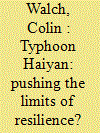

|
|
|
|
|
| Summary/Abstract |
Disaster risk reduction has been an important priority in the Philippines for the last twenty years. Yet Typhoon Haiyan still resulted in at least 6000 deaths and affected more than 14 million people. Why was this the case in a country supposedly well equipped to respond to natural disasters? While there are several explanations, including the sheer scale of this typhoon, corruption, and implementation challenges, this paper focuses on growing social and economic inequalities. This paper argues that the resilience discourse and framework at the national level do not translate into programs that help lift people out of poverty, particularly landless people. This is because state-led resilience policies focus on technical aspects of recovery rather than the root cause of vulnerabilities, explaining to some extent the high level of casualties in the wake of typhoon Haiyan. Evidence supporting this argument is drawn from more than forty interviews between 2013 and 2015 with disaster victims and professionals involved in resilience building.
|
|
|
|
|
|
|
|
|
|
|
|
|
|
|
|
| 9 |
ID:
186302
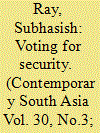

|
|
|
|
|
| Summary/Abstract |
Do perceptions of insecurity from politically motivated violence affect the decision of poor voters to re-elect incumbents in Indian elections? This article examines this question in the empirical context of the Maoist-affected Junglemahal region in the state of West Bengal in eastern India. Exploiting original survey data collected in 38 Maoist-affected villages in Junglemahal prior to the 2019 Lok Sabha election, I show that respondents (a) were able to discriminate between politically motivated violence and other governance-related issues, (b) were more inclined to vote for the incumbent the greater the importance attached to the provision of public goods, but (c) were less inclined to vote for the incumbent the greater the importance attached to politically motivated violence. In auxiliary tests, I find that the effect of the perceived threat from politically motivated violence was mediated by feelings of fear, anger, and worry about the general direction in which the state was going. I also present evidence showing a positive relationship between the level of campaign contact by the opposition party and the level of negative emotions experienced by voters.
|
|
|
|
|
|
|
|
|
|
|
|
|
|
|
|
|
|
|
|
|